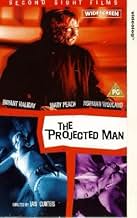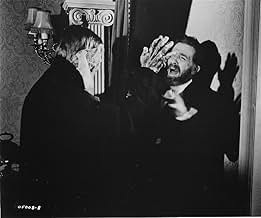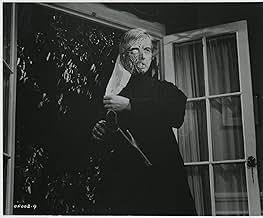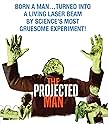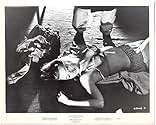AVALIAÇÃO DA IMDb
3,7/10
1,1 mil
SUA AVALIAÇÃO
Adicionar um enredo no seu idiomaA scientist experimenting with matter transmission by means of a laser beam decides to use himself as a test specimen. But the process goes awry, and one side of his body becomes deformed an... Ler tudoA scientist experimenting with matter transmission by means of a laser beam decides to use himself as a test specimen. But the process goes awry, and one side of his body becomes deformed and lethal to anyone it touches.A scientist experimenting with matter transmission by means of a laser beam decides to use himself as a test specimen. But the process goes awry, and one side of his body becomes deformed and lethal to anyone it touches.
- Direção
- Roteiristas
- Artistas
Derrick De Marney
- Latham
- (as Derrick de Marney)
Alf Joint
- Security Man
- (as Alfred Joint)
Joan MacDonald
- Reveller
- (não creditado)
- Direção
- Roteiristas
- Elenco e equipe completos
- Produção, bilheteria e muito mais no IMDbPro
Avaliações em destaque
It's a delightful but typical and overused cliché in horror movies that brilliant and obsessive scientists suddenly go bonkers and ruthlessly use themselves as guinea pigs with grotesque and catastrophic consequences. It's what makes this kind of movies entertaining, of course, but it's not exactly plausible. These brilliant men (or women) of science risk their lives even though they are practically certain the outcome will be irreversible and most likely fatal? Anyways, I'm always eager to watch a good old- fashioned "science gone wrong" horror flick; especially when it was made in Great Britain during the most flourishing decade for the genre (1960 – 1970). "The Projected Man" understandably became somewhat forgotten in between all the popular and high-grossing "Frankenstein" and "Quatermass" movies produced by the legendary Hammer Studios, but it's still a worthwhile effort with a decent screenplay, reasonable amounts of suspense and good gruesome make-up effects for its time. Doctor Steiner is a smart man, working on a hi-tech device that – during the first stage – vaporizes objects and then transforms them into pure energy that is kept is a cell, and then projected back into its original forms by a super-powerful laser. Don't ask me how it works, because I didn't understand one iota of all the technical details (and there are far too many overlong and purely technical monologues, by the way) but it's somewhat comparable to the "Tele-Pods" that previously featured in "The Fly". And here as well, the device works perfectly well with lifeless objects, but when Steiner attempts to project living tissue, the test animals die instantly and give off incredibly heavy electric shocks. Meanwhile, the director of the research facility wants the experiments to fail and even sabotages crucial demonstrations. I didn't quite capture why he – Dr. Blanchard – must terminate this genius scientific breakthrough, but at least he succeeds in driving Dr. Steiner to madness. He uses the unstable device on himself and re-emerges with a half-demolished face, a burning pair of hands capable of inflicting sudden death through electrocution and a lust for murdering everyone who gets in his way. I know it has a bad reputation, but I quite enjoyed "The Projected Man". Admittedly you require a fair share of patience and tolerance regarding stupid plot twists, dire love stories and tedious sequences set in cheap laboratory settings full of blinking lights and annoying buzzers. But when Steiner eventually goes on his rampage, it turns into a fun and unscrupulous midnight movie that I warmly recommend.
The Projected Man (1966)
** 1/2 (out of 4)
Dr. Paul Steiner (Bryant Haliday) is doing experiments on a laser machine that he hopes to use to transport objects from one place to another (think of THE FLY). All is going well until they suffer a setback at which point he experiments on himself. This leaves him as a deformed monster with the ability to electrocute people to death with a simple touch.
THE PROJECTED MAN is a British horror film that seems to be a decade too late in the game. I say that because this scientific tale just feels very old-fashioned for a film from 1966. As I said in my plot description, the plot is pretty much lifted from THE FLY and nothing about it had been updated to make it fit the era that it was released. Fans of Mystery Science Theater 3000 will also know that the film was spoofed by them and that helped form its current reputation.
In all honesty, THE PROJECTED MAN isn't a masterpiece or even a good film but at the same time it's not nearly as awful as some reviewers will make it out to be. As I said, the biggest problem is the fact that it's a bit too old-fashioned for its own good but there are still some good moments in the film. There's no question that the highlight of the picture is the monster itself. The doctor pretty much has half of his body burned and this deformed look is actually quite memorable. I thought the special effects were good for what they were and the monster certainly made the film worth sitting through.
Another good thing were the performances from Haliday, Norman Wooland and Mary Peach as the three lead doctors doing the experiments. I'd also argue that the cinematography was at least decent for this type of film. As far as the flaws go, the story itself is pretty unoriginal and it's really too bad that the monster didn't have more time in the movie. The movie works best when he's out killing but this takes up very little of the 77-minute running time.
THE PROJECTED MAN will appeal to fans of British horror films. It's not perfect but it's entertaining enough for what it is.
** 1/2 (out of 4)
Dr. Paul Steiner (Bryant Haliday) is doing experiments on a laser machine that he hopes to use to transport objects from one place to another (think of THE FLY). All is going well until they suffer a setback at which point he experiments on himself. This leaves him as a deformed monster with the ability to electrocute people to death with a simple touch.
THE PROJECTED MAN is a British horror film that seems to be a decade too late in the game. I say that because this scientific tale just feels very old-fashioned for a film from 1966. As I said in my plot description, the plot is pretty much lifted from THE FLY and nothing about it had been updated to make it fit the era that it was released. Fans of Mystery Science Theater 3000 will also know that the film was spoofed by them and that helped form its current reputation.
In all honesty, THE PROJECTED MAN isn't a masterpiece or even a good film but at the same time it's not nearly as awful as some reviewers will make it out to be. As I said, the biggest problem is the fact that it's a bit too old-fashioned for its own good but there are still some good moments in the film. There's no question that the highlight of the picture is the monster itself. The doctor pretty much has half of his body burned and this deformed look is actually quite memorable. I thought the special effects were good for what they were and the monster certainly made the film worth sitting through.
Another good thing were the performances from Haliday, Norman Wooland and Mary Peach as the three lead doctors doing the experiments. I'd also argue that the cinematography was at least decent for this type of film. As far as the flaws go, the story itself is pretty unoriginal and it's really too bad that the monster didn't have more time in the movie. The movie works best when he's out killing but this takes up very little of the 77-minute running time.
THE PROJECTED MAN will appeal to fans of British horror films. It's not perfect but it's entertaining enough for what it is.
This movie is no sci-fi/horror masterpiece by any stretch of the imagination. But it is far better than most of the reviewers on IMDb would have you believe. It was originally released here in the USA on the second half of a double bill with the somewhat better ISLAND OF TERROR with Peter Cushing. I convinced my dad to take me to the drive- in for the bill when it was released, but it was a school night and he wouldn't tumble to staying for the second feature. Since then, it has been notoriously hard to track down. I finally saw it about a year ago and was surprised on how entertaining it was, especially considering how I had read various disparaging things about it in the interim. It does borrow elements from the earlier FLY pictures as well as the Karloff film, THE INVISIBLE RAY, and is by no means particularly original. However, since when does that really detract from the enjoyment factor of a low budget, sci-fi monster film? For the most part, you better resign yourself to that going in, or else stop watching films altogether. In its favor, it does move at a fast pace, has decent actors and color cinematography, some nice grisly shocks and certainly decent effects for a low budget sixties film from England. An added bonus, there is a distinctly assertive heroine scientist played by Mary Peach, a character who remains in possession of her wits, and aggressively intelligent without being obnoxious (her character is the sympathetic colleague of Bryant Halliday who becomes the tragically disfigured, death-dealing PROJECTED MAN) Undeserving of its bad rep.
Someone knocked the script for this off about 10 minutes after watching THE FLY and they threw in a bit of MAN MADE MONSTER to make it look original. Bryant Halliday (CURSE OF THE VOODOO, etc.) is a scientist working on a matter transport device. Apparently he has not consulted the Delambre family in Canada or he'd know better. Even though he has never succeeded in teleporting living matter he decides to project himself right into the living room of the department head so as not to lose his funding. Bad move! Well Bryant does not end up with a fly head, no he is burned rather like Tor Johnson in NIGHT OF THE GHOULS but he gains to power to electrocute people by touching them. He seems to have changed so much that electricity has become his food; he gets weaker the more power he uses. An interesting concept suffers from the ho-hum approach and an ending, which I will not reveal here, that does not so much end the movie as it "stops" it; like they had run out of ideas to advance the plot and so just ended everything. Saturday afternoons were made for movies like this. Don't think about what you are watching, take it at face value and you will have a good time.
Bryant Haliday plays a research scientist named Paul Steiner, who's hard at work on a "projection" experiment: he hopes to be able to transmit matter from one place to another. His process works on inanimate objects, but not on living things. Despondent when it looks like the plug will be pulled on his entire operation, he uses himself as the first human guinea pig. As you can expect, this has disastrous consequences. When he regains human form, he's horribly disfigured, and has gained the "touch of death". (When he lays his mutilated hand on someone, they are electrocuted.) And, of course, he's now insane.
This British sci-fi / horror effort does owe a fair bit to "The Fly", putting just enough of a spin on the premise to not come off as a carbon copy. It's not a great story, but it does entertain quite capably nevertheless. It's paced reasonably well by directors Ian Curteis and John Croydon, clocking in at a painless 78 minutes. A great deal of what effectiveness it possesses comes from the performances of an excellent cast. Haliday is an earnest, sympathetic lead turned deliciously crazed antagonist, and ultimately tragic character. Ronald Allen and Mary Peach, as his worried colleagues, figure into a romantic subplot that doesn't waste too much of the running time. Norman Wooland and Derrick De Marney are superb at playing sneaky, nefarious types trying to discredit / ruin the experiment. Gorgeous Tracey Crisp is appealing as the helpful secretary, and Derek Farr has a solid, reliable presence as the obligatory inspector who picks up Steiners' trail. Legendary stuntman Alf Joint plays the security guard. The makeup by Eric Carter is pretty good for the time this was made, Kenneth V. Jones' music is good, and the widescreen photography helps to keep things visually interesting.
While the tale it's spinning is definitely on the routine side, this still makes for an enjoyable movie watching evening for fans of the science-fiction and horror genres.
Seven out of 10.
This British sci-fi / horror effort does owe a fair bit to "The Fly", putting just enough of a spin on the premise to not come off as a carbon copy. It's not a great story, but it does entertain quite capably nevertheless. It's paced reasonably well by directors Ian Curteis and John Croydon, clocking in at a painless 78 minutes. A great deal of what effectiveness it possesses comes from the performances of an excellent cast. Haliday is an earnest, sympathetic lead turned deliciously crazed antagonist, and ultimately tragic character. Ronald Allen and Mary Peach, as his worried colleagues, figure into a romantic subplot that doesn't waste too much of the running time. Norman Wooland and Derrick De Marney are superb at playing sneaky, nefarious types trying to discredit / ruin the experiment. Gorgeous Tracey Crisp is appealing as the helpful secretary, and Derek Farr has a solid, reliable presence as the obligatory inspector who picks up Steiners' trail. Legendary stuntman Alf Joint plays the security guard. The makeup by Eric Carter is pretty good for the time this was made, Kenneth V. Jones' music is good, and the widescreen photography helps to keep things visually interesting.
While the tale it's spinning is definitely on the routine side, this still makes for an enjoyable movie watching evening for fans of the science-fiction and horror genres.
Seven out of 10.
Você sabia?
- CuriosidadesDiscovered by Alex Gordon (I) as an unproduced screenplay by Hollywood writer Frank Quattrocchi, the film as assigned to be the directorial debut of writer Ian Curteis. However, due to his lack of experience, he ran into several problems during shooting. As the film fell behind schedule and the budget kept increasing, Curteis was fired during the film's final stages. Producer John Croydon replaced him; however, Croydon remained uncredited as the producers did not wish to publicize the problems that had occurred on set.
- Citações
Chris Mitchell: Pretty you may be.
- ConexõesFeatured in Terminus... the Theater of Science Fiction: The Projected Man (1970)
Principais escolhas
Faça login para avaliar e ver a lista de recomendações personalizadas
- How long is The Projected Man?Fornecido pela Alexa
Detalhes
- Tempo de duração
- 1 h 17 min(77 min)
- Proporção
- 2.35 : 1
Contribua para esta página
Sugerir uma alteração ou adicionar conteúdo ausente


